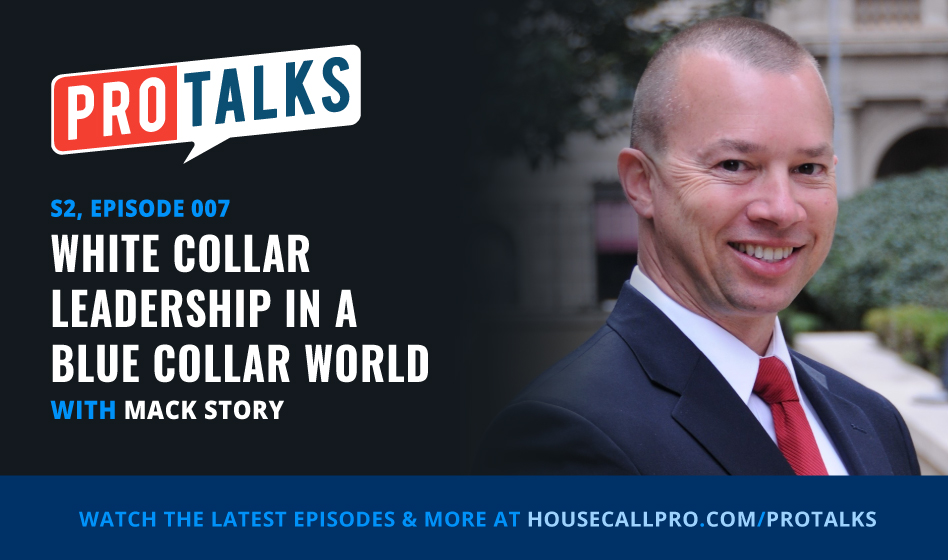
When Mack Story started learning about Dr. Stephen Covey’s seven habits of highly successful people, he saw a trend. He was watching videos with Dr. Covey and noticed that everyone in the audience at least appeared to be white-collar.
But the principles he was learning could be applied, just as well, to any of the blue-collar trades. This realization turned into a life-changing mission for Mack.
“I wanted to take my blue-collar experience, my blue-collar stories, wrapping around these same principles, and package it in a way that would be accessible and actually interesting to the blue-collar workforce: those who lead them and those who support them,” Mack explains on the podcast.
Protalks: Blue collar leadership with Mack Story
In this episode of Pro Talks, Housecall Pro’s Alexa and Roland speak to Mack and his wife Ria who teach leadership habits that help transform businesses. In this post, we offer some of the highlights from their chat.
Applying leadership principles help solve the hiring problem [13:41]
Becoming a leader will attract talent. “When you think of great organizations, they attract people from all over the place. And so it’s not a geographical issue, it’s a leadership issue. And we see that good employees do have options.”
When you attract talent to you, you’re no longer in a position where you’re desperate for the next hire. This is a matter of building up a sphere of influence through referrals and brand recognition.
True leadership is based on personal development which leads to influence [15:12]
Mack and Ria have built a methodology around transforming yourself and your business. And the foundation of this methodology is leadership development. They think of leadership as the positive influence that you have over other people based on character development.
“Whatever it is they’re trying to accomplish, if they want better people on their team, if they want more business, they want better referrals … that’s based on influence,” Mack explains.
Develop authentic influence [17:50]
The influence that they’re encouraging owners to cultivate isn’t a given based on having a position of power:
“It’s not about being the boss. It’s about developing positive influence with people,” Mack says. “Position is actually the lowest level of leadership. We have talked about the five levels of leadership by John Maxwell, the position is the lowest level.”
Mack calls this “artificial influence,” when you have influence simply based on a position. Instead, he wants to encourage people to develop “authentic influence” that you have to earn.
Creating influence isn’t a selfish act, it actually involves building up those around you. “When we have more influence, life gets better, right? We’ve got more options. We’ve got more opportunities, and we cannot grow an organization — we cannot grow a company if we don’t grow the people in the organization,” Ria adds.
People buy into the leader before their vision [20:37]
The difference between artificial and authentic influence is whether people want to follow you, or whether they have to because of the job. Mack explains that in true buy-in, people volunteer to follow your vision, they’re not forced to because of their position.
And this buy-in doesn’t start when you develop a strong vision, it happens when you develop strong leadership skills (based on character development) that, in turn, develops strong positive influence.
“John Maxwell says it best. If you think you’re a leader and you turn around and nobody’s following you, you’re just out taking a walk,” Mack says.
So how do you start getting buy-in? One of Mack’s strategies is to start by asking questions instead of giving advice. When you ask questions, Mack explains, two things happen:
- You learn how they think. “If they think in a way that you like, and it builds trust, that’s what happens. It builds trust. You trust the way that they think. So you give them a little more space. If you don’t like the answer, you get to teach them something.”
- You learn something and share the opportunity to be educated and empowered. “So when you ask somebody a question, you’re transferring influence, I’m transferring influence to you, and then now you have an opportunity to influence me.”
Influence without Competency Leads to Anxiety [27:03]
The entire transformation equation that Mack and Ria teaches is: Leadership Development + Buy-in + Unifying Purpose + Competency + Execution = Transformation
Each of the principles fits together to create transformation, and when you’re missing one component, Mack and Ria identified common responses (which you can see in their chart here).
For instance, if owners or managers have buy-in from their team, and a unifying purpose, competency to execute everything well, but they haven’t spent time developing leadership skills, they often end up frustrated. Something still goes wrong.
Similarly, when you’ve been developing your leadership skills, buy-in, etc, but you aren’t yet competent at what’s required of you as a leader, then you’ll find yourself anxious and stressed.
Seeing which emotion you’re commonly feeling can help you figure out which principle you need to focus on.
But Ria adds that practicing all these skills doesn’t mean that anything is wrong. “It’s realizing, and then coming from a place of, there’s nothing wrong with me as a leader, but I don’t have to be sick to get better. We all have potential to grow and to do better.”
You can start small [39:45]
When you’re running a business, the idea of intentionally practicing leadership skills can seem daunting. Mack’s advice is to simply start small.
“When we’re speaking, I always hold up my hand and tell people, ‘How long does it take you to read a paragraph?’ And usually somebody says 30 seconds. I’ll say, ‘That’s all I’m asking you to do: 30 seconds. You may be busy, but you got 30 seconds.’ So that’s my rule,” Mack says. “Sometimes I may read a whole book, but my goal is only to read one paragraph a day. And usually I’ll read more than that. But if I read one, I’ve kept my commitment to myself.”
Resources mentioned in this episode
- 7 Habits of Highly Successful People by Stephen R. Covey
- The 5 Levels of Leadership: Proven Steps to Maximise Your Potential by John C Maxwell
- Leadership and Self-Deception: Getting Out of the Box by The Arbinger Institute
- Atomic Habits: An Easy & Proven Way to Build Good Habits & Break Bad Ones by James Clear
- Blue-Collar Leadership & Culture: The 5 Components for Building High Performance Teams by Mack Story
- The first five chapters of all of Mack Story’s books on the topic of blue-collar leadership can be found at bluecollarleadership.com
- Ria’s website, riastory.com, contains resources about becoming a woman of influence
- Fearfully and Wonderfully Me℠ Podcast (Ria’s podcast)
- Blue-Collar Leadership® Podcast (Mack’s podcast)






